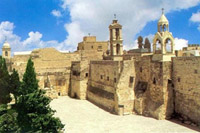Bethlehem's Church of the Nativity to be restored

Preparations for a long-needed renovation of the 1500-year-old Church of the Nativity, the supposed site of Jesus' birth, are moving ahead in Bethlehem in the face of political and religious conflicts that have kept one of Christendom's holiest sites in a state of decay for centuries.
The first and most urgent part of the renovation, initiated by the Palestinian government in the West Bank, is meant to replace the building's roof.
Ancient wooden beams pose a danger to visitors, officials say, and leaks have already ruined many of the church's priceless mosaics and paintings.
If the repairs go ahead as planned next year, it will be the first time the crumbling basilica has seen major renovation work in more than a century and a half.
Altering a building like the Church of the Nativity, built 15 centuries ago on the site of a church 200 years older than that, is never a simple affair.
The building is shared by three Christian sects - Catholics, Greek Orthodox and Armenians - who have traditionally viewed each other with suspicion and are wary of upsetting the brittle status quo that governs the site.
Some measure of the complications involved in a renovation of this type can be found in the Nativity's similarly ancient and fractious sister church, the Holy Sepulchre in Jerusalem. When a 1927 earthquake badly damaged that building, it took the rival sects more than three decades to agree to major repairs and another three to complete them.
Today, the increasingly dire state of the Nativity's roof and the intervention of an external player in the form of the Palestinian Authority - which has circumvented the old rivalries and allowed all to save face - has led the three churches to agree to a renovation to be arranged and funded by the Palestinian government and international donors.
The PA and its president, Mahmoud Abbas, are eager to win recognition for the basilica from Unesco as a World Heritage Site, but an earlier application was not accepted because Unesco did not consider the Palestinian government a state.
That changed last month, when, in a controversial decision that triggered a funding cut-off by the United States, the UN's cultural arm decided to grant recognition.
The Palestinians are now hoping their application will be approved. The renovation is motivated, in part, by a desire on their part to prove they are responsible stewards of sites of global importance.
"Our president has issued a decree to restore the roof and to prepare for the restoration of the church on behalf of the three churches and in coordination with the three churches, which obviously cannot do it on their own," said Khouloud Daibes, the Palestinian tourism minister.
A high-tech survey by experts from Canada, Italy and elsewhere ended earlier this year.
Source: New Zealand Herald, the Metropolitanate of Montenegro and the Littoral

